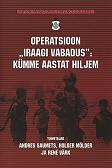IRAAGI 2003. AASTA OPERATSIOON, SELLE TAGAMAAD JA MÕJU RAHVUSVAHELISELE SÜSTEEMILE NING IRAAGI RIIKLUSE ARENGULE
THE IRAQI OPERATION OF 2003 - ITS BACKGROUND AND INFLUENCE ON THE INTERNATIONAL SYSTEM AND THE DEVELOPMENT OF IRAQI STATEHOOD
Author(s): Holger MölderSubject(s): Politics / Political Sciences
Published by: Kaitseväe Ühendatud Õppeasutused
Keywords: Iraq; international system; political cultures; international military operations; military intervention; panislamism; panarabism
Summary/Abstract: The end of the Cold War caused paradigmatic changes in the international system. The new postmodern system was a Kantian one, in which the general principles of cooperation replaced the principles of conflict and competition. However, many Hobbesian security environments were maintained within the Kantian system, and the Middle East was one of them. So-called deviant states opposed the new Kantian system and did not accept the international norms that accompanied it: they developed weapons of mass destruction, supported international terrorism and crime, and denied human rights, including the rights of ethnic, religious and cultural minorities. The regime of Saddam Hussein in Iraq can be also identified as such a deviant state. Iraq was created after World War I, and from that time the country was ruled by the Sunni Arab minority, who dominated over the numerous ethnic and religious groups, notably the Shia Arabs and Kurds. In 1968, the socialist-nationalist Baath Party came to power. In 1990, Iraq occupied neighbouring Kuwait, which led to international military operation against them. The Iraqis had to abandon Kuwait, but Saddam Hussein maintained his power in Iraq. A decade later, in light of the Global War against Terrorism, Iraq again received international attention as Saddam Hussein was accused of promoting weapons of mass destruction, and attempting to build up its nuclear capability. An international coalition led by the United States and United Kingdom decided to attack Iraq, and overthrow the regime of Hussein. This action was resisted by many of their allies, primarily France and Germany, who argued that it would destabilize the entire international system. The initial phase of the military intervention was successful and the resistance of the Iraqi regular forces was easily destroyed. The occupying powers, however, met with difficulties in establishing a peaceful environment, and were also met with resistance from Islamist groups that had previously been suppressed by the ruling Baathists. The military operation has been followed by the civil war. The Iraqi experience has taught that it is impossible to solve international crises relying solely on military power, and a military operation must be followed by successful peace-building and state-building programs.
Journal: KVÜÕA toimetised
- Issue Year: 2014
- Issue No: 18
- Page Range: 40-70
- Page Count: 31
- Language: Estonian

